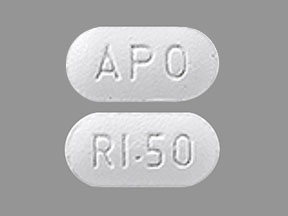
Riluzole is a medication prescribed for the treatment of amyotrophic lateral sclerosis (ALS), commonly referred to as Lou Gehrig's disease. This drug is designed to slow the progression of ALS symptoms and potentially extend a patient's survival by about 2 to 3 months. Riluzole works by acting as a glutamate antagonist, which means it reduces the release of glutamate, a chemical that may contribute to nerve damage in ALS. By decreasing glutamate levels, it helps limit nerve damage and slows the worsening of symptoms like muscle weakness. Riluzole is available in different forms, including a liquid and oral film, which can be beneficial for individuals who have difficulty swallowing pills. Always consult with a healthcare professional to ensure this medication is appropriate for your condition.
Our coupons are free to use. Before paying, show the pharmacist your Riluzole savings card to get your free discount. Use our filters below to edit the prescription box to match your needs. The Riluzole prices will update based on your prescription needs. Above our Riluzole coupons, you can change your location to see pharmacy prices and costs in other areas. We're here to help you buy Riluzole at the lowest price with our prescription discount card.
My prescription
Edit
50MG, Riluzole (180 Tablets)
Select pharmacy

CVS
$54.70
COUPON PRICE
Albertsons
$68.88
COUPON PRICE
Walgreens
$79.20
COUPON PRICE
Walmart
$94.15
COUPON PRICERiluzole savings card
Show this card to your pharmacist
CVS
$54.70
BIN
ID
PCN
GRP
011867
LH585313BB
HT
LABH001
Powered by
Riluzole is a medication prescribed for the treatment of amyotrophic lateral sclerosis (ALS), commonly referred to as Lou Gehrig's disease. This drug is designed to slow the progression of ALS symptoms and potentially extend a patient's survival by about 2 to 3 months. Riluzole works by acting as a glutamate antagonist, which means it reduces the release of glutamate, a chemical that may contribute to nerve damage in ALS. By decreasing glutamate levels, it helps limit nerve damage and slows the worsening of symptoms like muscle weakness. Riluzole is available in different forms, including a liquid and oral film, which can be beneficial for individuals who have difficulty swallowing pills. Always consult with a healthcare professional to ensure this medication is appropriate for your condition.
Our coupons are free to use. Before paying, show the pharmacist your Riluzole savings card to get your free discount. Use our filters below to edit the prescription box to match your needs. The Riluzole prices will update based on your prescription needs. Above our Riluzole coupons, you can change your location to see pharmacy prices and costs in other areas. We're here to help you buy Riluzole at the lowest price with our prescription discount card.
Related benzothiazoles prescriptions
coupons from$2109.09Save 70%
More prescriptions for als
coupons from$55.06Save 40%
Related benzothiazoles prescriptions
Tiglutik Save 70%coupons from $2109.09
More prescriptions for als
Rilutek Save 40%coupons from $55.06
Riluzole dosage forms
Use our Riluzole 50MG coupon with prices from $55.06 for 180 Tablets. You can also use our Riluzole 50MG coupon with prices from $27.89 for 60 Tablets.
Dosage Quantity Price from Per unit 50MG 180 Tablets $55.06 $0.31 50MG 60 Tablets $27.89 $0.47
| Dosage | Quantity | Price from | Per unit |
|---|---|---|---|
| 50MG | 180 Tablets | $55.06 | $0.31 |
| 50MG | 60 Tablets | $27.89 | $0.47 |
